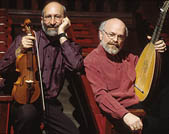Crunchy vegetables, Mahler 8th and other tastes
June 5, 2006
_____________________________________________________
Grrr -- missed the opening of Mozart's Idomeneo this weekend (insert gnashing of teeth, pulling of hair) but was more than consoled by the Folger Consort/Concord Ensemble performance in the Folger Library's Elizabethan Theater on Friday, and the amazing Nurit Bar-Josef leading the KenCen Chamber players through Richard Strauss' early piano Quartet in C Minor on Sunday -- which just about took the top of my head off (review published tomorrow). (Tom Huizenga covered Idomeneo for the Post, and Charles T. Downey over it ionarts has a more extended take on it.)
A fascinating conversation this weekend with Henry Louis de la Grange, Mahler scholar extraordinaire, to discuss the Eighth Symphony's continuing appeal. “He was in a state of real ecstasy when he wrote that symphony,” he said in a telephone interview from his home in Switzerland. “And it’s a great spiritual statement -- a message of hope for humanity as a whole. Some people find it hard to understand, because they feel that Mahler has to be morbid, or he isn’t Mahler -- but that is just simply wrong!” It opens at the Kennedy Center on Thursday night, for three nights -- all sold out weeks ago.
Here's a quick take on Friday's Folger Consort performance:
The Folger Consort
The Washington Post: Renaissance music -- with its crunchy textures and low-fat sonorities -- can sometimes seem like the plate of raw vegetables at the classical music buffet. But in the right hands this music can reveal rich and meaty depths, as the multi-talented Folger Consort demonstrated this weekend at the Folger Shakespeare Library.
The Folger teamed up with the vocalists of The Concord Ensemble on Friday night for an intriguing launch to this year’s Washington Early Music Festival. Alternating instrumental pieces from composers like Girolamo Frescobaldi and Salamone Rossi with 16th Century vocal works by Luca Marenzio (a.k.a. “the Schubert of the madrigal”) and Thomas Morley, the players delivered precise, elegant performances – but also pushed through the music’s courtly façade to reveal the fires at its core.
And that’s easier said than done. The hurdles to a satisfying historically-accurate performance can be huge -- lutenist Christopher Kendall got a round of applause just for tuning the approximately six thousand strings of his theorbo -- but so are the rewards. Robert Mealy, cradling his violin at chest level, turned in some profoundly moving playing (Tobias Hume's "The passion of musicke" was a minor miracle), as did Brent Wissik on viol.
But the focus was really on the singing, and the Concord Ensemble delivered spectacularly, with exceptional control and feeling. And, while there was a certain amount of happy tra-la-la-ing in the bosky dell -- you can’t get through a madrigal evening without it – the music was more often hauntingly beautiful: delicate tapestries barely concealing a sea of dark and hungry passions.


Reader Comments